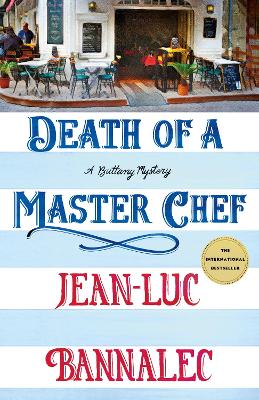I haven’t read many books set in present-day France. However, I have read more than enough WWII-era books that described what Paris and the surrounding regions looked like at that time. My decision to read wasn’t solely based on that, though. The blurb definitely caught my attention, and being set in present-day France was also part of my decision.
Death of a Master Chef is the ninth book in the Kommissar Dupin series. It can be read as a standalone, but I suggest reading books 1-8 first. That way, you get background on Dupin and other police mentioned in the book.
This series (up to book 9) has been translated from German. If you look at the series listing above, I included all of the English versions. A few books haven’t been translated yet (it seems like St. Martin’s Press is working on that). If you read German, you’re good to go; if you want an English version, you might have to wait for the upcoming books.
The main storyline in Death of a Master Chef follows Dupin as he investigates the murder of a famous chef by her sister (and no, these are not spoilers; the author lets that be known in the first chapter). Dupin, who is in Saint-Malo for a police seminar, was in a farmer’s market when the victim (Blanche) was stabbed to death by her sister (Lucille). He is warned not to get involved but can’t help himself. Eventually, he gets assigned a team consisting almost entirely of Breton police. As Dupin follows the clues, more bodies are found. How are the bodies found connected to Blanche’s murder? The closer he gets to an answer, the more he gets stonewalled by the suspect, her friends, and her lawyers. The answer to why Blanche was killed will stun even Dupin.
I loved that the author laid everything out initially, except for the motive. Seeing the police go through their investigation, interview suspects, and eventually narrow down their motives was fascinating to me. I can see things like why the person did it and the reasons behind it fairly early in the book. But in this case, everything was revealed at the end of the book.
I liked Dupin. His mind went a thousand miles a minute (and we were subjected to it all). He wrote everything down in his notebook and questioned when something seemed wrong. He also was fearless in tracking down leads that didn’t seem necessary. I also loved that he was a foodie. He relished every single bite of food and drink of petit cafe (small coffee) that he got. It opened my world to new food ideas (except for the seaweed butter, which I will never try).
The end of Death of a Master Chef was interesting. Lucille’s reason for what she did was heartbreaking. I was also surprised at what set off that final confrontation. If only that phone call had not been made (and that’s all I will say about that).
Many thanks to St. Martin’s Press, Minotaur Books, NetGalley, and Jean-Luc Bannalec for allowing me to read and review this ARC of Death of a Master Chef. All opinions stated in this review are mine.
